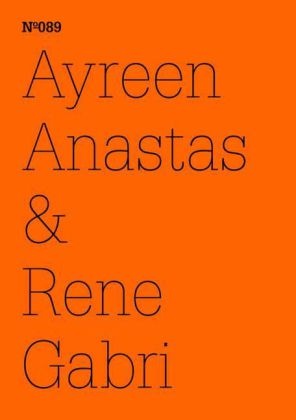Read more
Das Notebook 089 ist das Ergebnis des immensen Wandels, der sich seit 1989 vollzogen hat. Mit dem Ende des Kalten Krieges sah sich die neoliberale Utopie einer globalen Expansion des Kapitalismus durch keinerlei psychische, physische, ethische, nationale oder ökologische Grenzen mehr behindert. Weltweit übernahm sie für Nationalstaaten eine neue Funktion: Geleitet von Kreditwachstum und begleitet von "Strukturanpassungen" wurden die Gewinne privatisiert und Kosten sozialisiert. Innerhalb von nur 20 Jahren trat der Bankrott dieses Paradigmas zutage. Die Welt heute ist gekennzeichnet durch Konflikte, Rezession, extreme Ungleichheit sowie unumkehrbare ökologische Schäden und nur dank jener staatlicher Interventionen, die sie hatte ablösen wollen, kann die ökonomische Grundausrichtung überleben. Diese Notizen berichten nicht davon, sondern von den Folgen. Sie vollziehen den Arbeitsprozess zweier Künstler nach, die diese entscheidende Epoche gedanklich begleiteten, während sich aus Gruppentreffen und Diskussionen die Occupy-Bewegung entwickelte. Statt Occupy definieren zu wollen, stellt dieses Notebook eine Reihe von Positionen, Ideen und Gesprächen vor, die als Spuren von individuellen Aussagen und Kartierungen von multiplen Erfahrungen des Widerstandes gegenüber den herrschenden Strukturen von Kapital und Macht dienen. Ob in Cochabamba oder Tunis, Kairo oder Fukushima, Madrid oder Athen, New York, Carbondale oder anderswo - die Fortsetzung dieser Auseinandersetzungen um Autonomie und Bestätigung alternativer Lebensformen findet sich hier in Notizform.
Summary
Notebook 089 is a result of the immense changes that have taken place in the world since 1989. With the end of the Cold War, the utopian neoliberal fantasy of a global capitalist expansion, unfettered by the limits of any borders (psychic, physical, ethical, national, or ecological) and governed through an extension of credit/debt coupled with correlated “structural adjustments,” assumed a new function for nation-states around the world, as a privatizer of gains, and a socializer of costs. In a span of twenty years the insolvency of this paradigm has become evident; not only has an entire world been gripped by conflict, depression, extreme inequalities, and irreversible ecological damage, but, in addition, the economic basis underwriting all of this is unable to continue without the very state intervention that had supposedly been rendered unnecessary. These notes do not recount this story, but rather take place in its wake, while also marking out the process of thinking through this critical epoch, in the midst of collective meetings and discussions leading up to and through what would be called Occupy. Rather than fixing these movements, this notebook collects a series of positions, ideas, and conversations, which trace individual articulations and provide multiple cartographies of events in which people said “no” to regimes of concentrated wealth/power from Cochabamba to Tunis, from Cairo to Fukushima, from Madrid to Athens, from New York to Carbondale, and beyond. Here, one will find a continuation of those struggles for autonomy and the affirmation of different forms of life in note form.
Ayreen Anastas and Rene Gabri are artists and Agents for dOCUMENTA (13).

